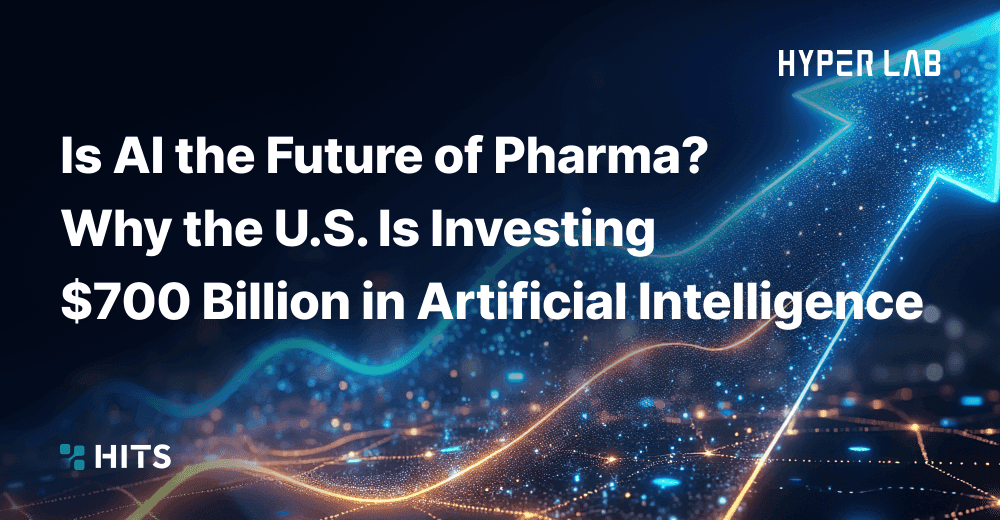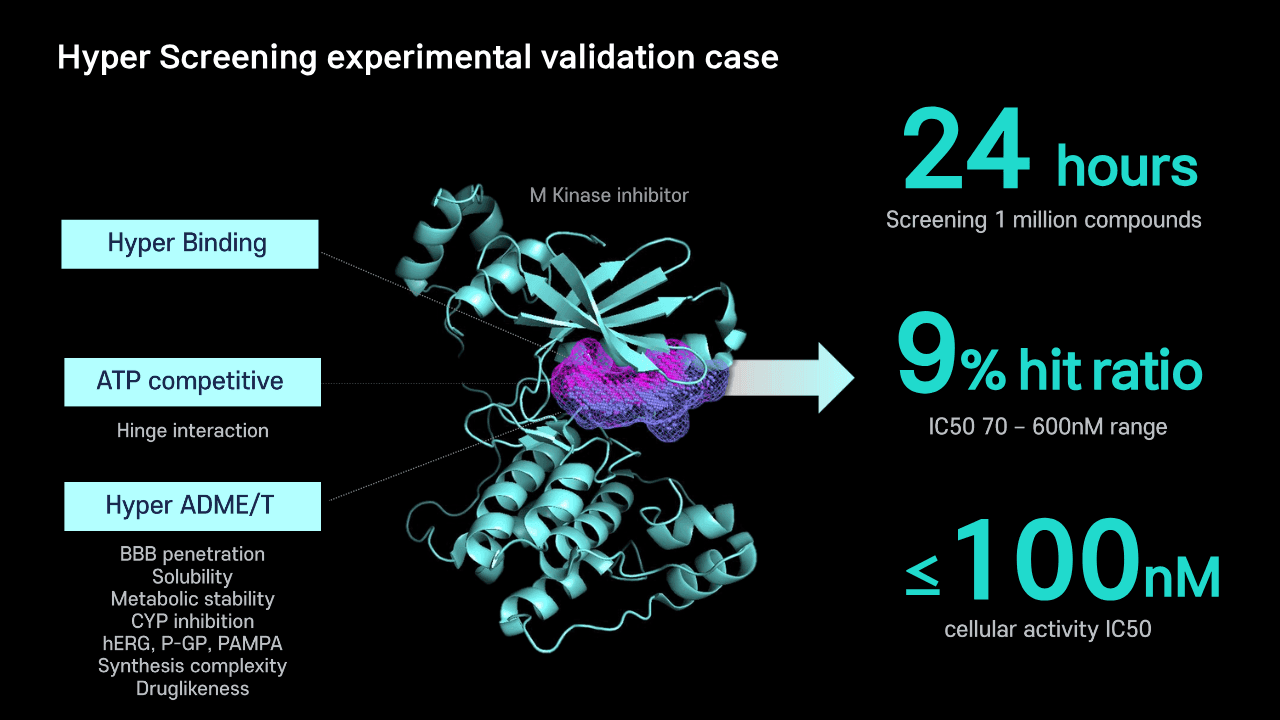Is AI the Future of Pharma? Why the U.S. Is Investing $700 Billion in Artificial Intelligence


Hello, We are the HITS HyperLab team, pioneering the future of AI-driven drug discovery.
One of the hottest topics recently is the massive investment announced by U.S. President Trump: the "Stargate" project. This project has a staggering scale of $500 billion. Never before in human history has such an enormous sum been invested in a single AI project.
Some interpret this unprecedented investment as a strategic move by the U.S. to secure dominance in the AI industry. However, concerns are growing about whether such a heavy focus on AI is genuinely safe. So, why is Trump pushing forward with the colossal "Stargate" project? What kind of future does he envision? Today, we aim to explore these questions, delving into the implications of the "Stargate" project and the shifting power dynamics in the AI era.

AI and Pharmaceuticals: Why Artificial Intelligence is Gaining Attention as a "Life-Extension Technology"
The once-fantastical dream of "immortality," a staple of science fiction, is now becoming a realistic topic of discussion. At the heart of this shift is AI technology. There is growing anticipation that AI could significantly extend human life expectancy by conquering deadly diseases like cancer and dementia. Renowned futurist and author of The Singularity is Coming, Ray Kurzweil, has predicted, "Through simulated biology, we will be able to cure all diseases like cancer and heart disease, extending our lifespans" (theguardian.com). He envisions the fusion of AI and biotechnology as a breakthrough that will dramatically extend human life.
Indeed, AI is making remarkable strides in areas like cancer and intractable diseases, which were previously difficult to tackle. Cancer, the leading cause of death worldwide, could lay the foundation for extending human life if effective treatments are developed. AI is proving instrumental by analyzing vast medical datasets to identify new therapeutic targets or design drug candidates that were previously undetectable. In the past, finding drug candidates required years of trial and error, but now AI enables the virtual screening of millions of compounds through computer simulations, pinpointing the most promising therapeutic molecules.
As a result, AI is driving the discovery of targeted anticancer drugs that selectively attack cancer cells and novel compounds that could halt the progression of degenerative diseases. If these AI-developed drugs are successfully introduced into clinical practice and their efficacy is validated, it is anticipated that currently untreatable conditions like cancer and other incurable diseases could be overcome. Below is a table summarizing notable examples of AI-driven drug candidates currently in development or entering clinical trials.
Examples of AI-Based Targeted Anticancer DrugsInsilico Medicine / USP1 Inhibitor
| Company/Drug Name | Indication | Development Stage | Technology Overview | Features | Link |
|---|---|---|---|---|---|
| Insilico Medicine / USP1 Inhibitor | Blocks DNA Repair in Cancer Cells Preclinical | Preclinical | AI identified USP1 target and designed inhibitor | Selective action on cancer cells over normal cells |
Insilico Medicine wins IND approval for AI-designed USP1 inhibitor |
| Exscientia / A2A Receptor Antagonist | Immuno-oncology (T-cell activation) | Phase 1/2 clinical | AI-designed drug to block A2A receptor | Blocks immunosuppressive pathways with minimal impact on normal cells | Exscientia Reports Topline Data From EXS-21546 Phase 1a |
| Insilico Medicine / INS018_055 | Idiopathic pulmonary fibrosis (IPF) | Phase 2 clinical | First AI-designed drug candidate | Potential to halt or reverse fibrosis progression | INS018_055 for Idiopathic Pulmonary Fibrosis |
| Recursion / CDKL5 Candidate | CDKL5 deficiency neurodegenerative disorder | Preclinical | AI-driven candidate discovery, validated efficacy in cellular and animal models | Restores neuronal growth and delays degeneration | Recursion Announces Promising Clinical Data on Lead AI-Based Drug Candidate for Brain Disease |
President Trump’s “Stargate” Project: A $500 Billion AI Infrastructure Initiative
In January 2025, shortly after his inauguration, President Trump announced the ambitious “Stargate Project,” a massive AI infrastructure plan, at the White House. This project is a colossal joint venture funded by private companies, including OpenAI (the developer of ChatGPT), Japan’s SoftBank, and Oracle. It aims to invest $500 billion (approximately 700 trillion KRW) over the next four years to build AI-dedicated data centers across the United States. The initial phase involves a $100 billion investment to construct 10 data centers in Texas, with plans to expand to a total of 20 large-scale AI centers nationwide. The announcement was attended by OpenAI CEO Sam Altman, SoftBank Chairman Masayoshi Son, and Oracle Chairman Larry Ellison. Altman expressed optimism, stating, “Thanks to AI, the speed of curing diseases like cancer and heart disease will accelerate at an unbelievable pace.” President Trump echoed this sentiment, emphasizing that “AI is the key to eradicating diseases” and highlighting strong expectations for AI-driven drug development.
The Current State of AI-Driven Drug Development
So, why is President Trump placing such high expectations on AI-driven drug development?
The recent unveiling of AlphaFold3 provides a compelling answer. AlphaFold3 symbolizes the transformative potential of AI in the life sciences. This AI technology has reached a level where it can predict the 3D structures and interactions of various biomolecules, including proteins, DNA, RNA, and small-molecule compounds.
Furthermore, tangible successes are emerging in the early stages of drug development. The globally renowned MD Anderson Cancer Center, for instance, utilized HITS’s AI drug development platform, HyperLab, to identify promising compounds. While traditional methods struggled to find active compounds with sub-micromolar potency even after five years of experimentation, HyperLab enabled the design of a compound with 60nM activity in just three months. This case is a landmark example, demonstrating that AI can dramatically reduce the time and cost of drug development, showcasing its boundless potential.

FDA to Gradually Reduce Animal Testing, Plans to Introduce AI-Based Models
On April 10, 2025, the U.S. Food and Drug Administration (FDA) officially announced plans to phase out the reliance on animal testing in drug evaluation processes, adopting so-called “Human-Relevant Methods,” including AI-based computational models and lab-grown human organ-like structures. FDA Commissioner Martin Makary stated, “This paradigm shift in drug evaluation reduces animal use while offering the potential to accelerate healing and meaningful treatments for Americans.” This policy shift signals that the role and significance of AI in drug development will continue to expand. Moving forward, AI is expected to evolve beyond a mere supportive tool, becoming a cornerstone technology in drug design, prediction, toxicity assessment, and clinical trials.
Trump’s Stargate: Standing at the Threshold of a Grand Experiment
The “Stargate” project is more than just an AI infrastructure initiative; it represents a pivotal moment to gauge how AI will transform the pharmaceutical industry and human health. With a staggering $500B investment in AI-driven drug development, the United States has effectively declared a “second space race.”
We stand now at the dawn of this monumental experiment. Within the next two to three years, we may witness AI-developed drugs being used in hospitals and personalized treatments becoming commonplace. President Trump may have launched this project to secure this future faster than any other nation.
If AI enables the development of drugs to conquer cancer and intractable diseases—challenges humanity has yet to overcome—the U.S. economy will likely be the first to reap the benefits. This could position the U.S. advantageously in trade, negotiations, and even conflicts. Ultimately, as AI achieves what was once impossible, it could lead to a decisive victory in what is often called the global “hegemony race.” Trump’s vision for a better future likely played a significant role in driving this project forward.
Currently, not only the U.S. but also South Korea, China, Japan, Europe, and other nations are accelerating advancements in AI-driven drug development. Through this virtuous competition, we hope to see the remarkable achievement of extending human life come to fruition.
Start your Free-trial: https://buly.kr/1n3zJbG
Schedule an Meeting: https://abit.ly/6tr1uz